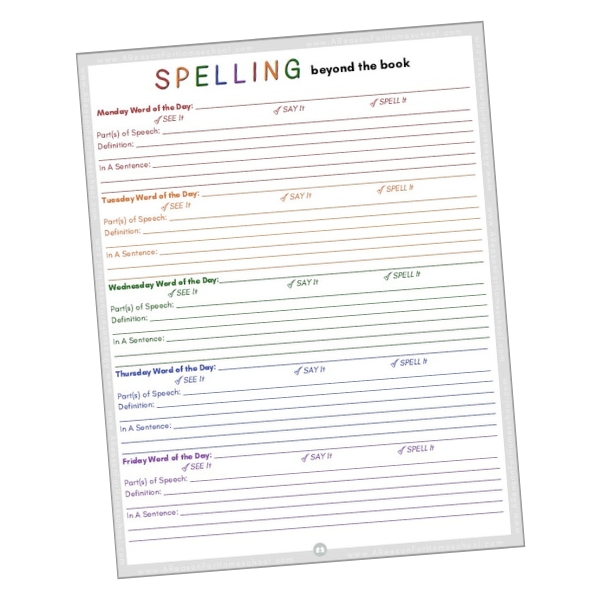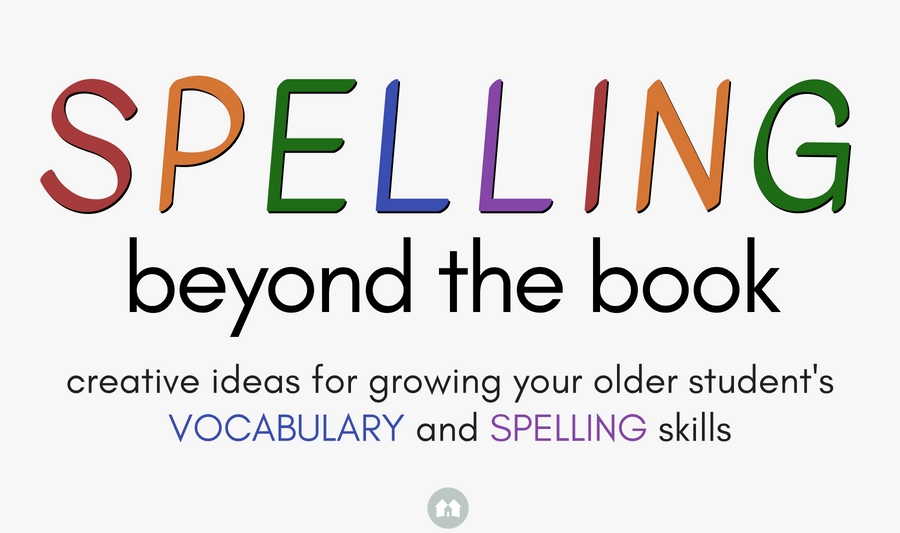As our children move up the academic ladder, new subjects are added to their course list: algebra, biology, chemistry. To make room for these new topics, others are left behind: spelling, reading, grammar.
While the new year may call for leaving those subjects off the schedule, it may not mean our children have mastered them. Perhaps we must instead be more creative and intentional, as we work those learning opportunities into our daily homeschool routine.
Our sponsor, A Reason For, publishes an excellent spelling curriculum, A Reason For Spelling for Levels A – F (typically, 1st – 6th grades). We continue to receive questions about how to teach spelling after Level F.
Today, I’ll attempt to answer that question and provide some practical (and fun) ways to make it happen.
A good spelling curriculum not only teaches a child how to spell a word, but what the word means and how to use it in a sentence. To that end, spelling comes under the umbrella with vocabulary, creative writing, and even public speaking. A broad vocabulary will not only identify our children as well-educated, but will pay great dividends at standardized test time!
We’ve developed a free download to help your children add one new word each day to their spelling — as well as speaking and writing — vocabulary. Our printable Spelling Beyond the Book Worksheet is designed to help kids conveniently keep track of a week’s worth of newly-introduced words on one page.
Sources for those new words may be your science or history curriculum, the current read-aloud, or a vocabulary word book (we used Vocabulary Cartoons).
My absolute favorite source is the Merriam-Webster Word of the Day. Years after my family’s homeschooling journey was complete, I still subscribe and love receiving this daily email delivered to my box! Not only does it give the word, but also an audio for learning correct pronunciation, the definition, use in a sentence, etc. The Merriam-Webster site also offers a variety of online games for learning and spelling vocabulary words.
Other sources for words:
- College Board Top 100 Common SAT/ACT Vocabulary Words
- Kaplan’s The 100 Most Common SAT Words
- PrepScholar’s Top 150 ACT Vocabulary Words
- 100 Words Every College Student Should Know
Now that you have your words, here are my ten suggestions for owning them:
- Each week, print a
Spelling Beyond the Book Worksheet
for each child and include it with that week’s school work. Train them to complete it as part of their start-the-day routine. Allow them to look it up the old-fashioned way (with a real dictionary) or utilize an online resource such as MerrianWebster.com or Dictionary.com.
Consider making some time to share sentences during lunch or another break from schoolwork. This will encourage some humor as they try to outdo one another (a little harmless sibling rivalry is great for sparking creativity). It will also make fond memories — as well as help ensure your kids remember their word of the day!
- Every Friday, pull out letter tiles from an old Scrabble game (or raid your Bananagram pouch) and challenge them to spell each of their words for the week. Make it fun — and more competitive — by timing them. Mix up the tiles and let them try to beat their first time!
- Set up a Vocabulary Jar on the kitchen counter or schoolroom table, and pay a quarter for each use of a vocabulary word. We called those “50-cent words” at our house — even though I only paid a quarter! Expect silliness (as well as memories) to escalate, and save the money for a special family outing.
- Challenge the kids to weave new words into dinner-table conversation, without Dad realizing it. They will need to be clever so word use doesn’t sound contrived. If Dad nails you (“Is taciturn your vocabulary word for the day?”) then you lose. Make it through dinner without Dad catching on to your word, and you’re excused from clean-up duty!
- Marketplace Challenge: Twice the quarters in the jar — or a true “50-cent word” at our house! — when a vocabulary word is used in public: when addressing a store clerk, bank teller, postman, etc. (See page 2 of the Spelling Beyond the Book Worksheet download for sample sentences, using words taken from the PrepScholar vocabulary list mentioned above.)
- Heads Up!: Write vocabulary words out on note cards. Place the cards face down. Player 1 picks up the card and (without looking) places it over his/her forehead. Everyone else tries to give clues to help Player 1 say the word. Make it more competitive — and fun! — by using a timer and playing in teams.
- Twenty Questions: This is similar to Heads Up! However, Player 1 can ask only Yes-or-No questions of his teammate as he tries to identify the word. Questions such as:
• Is it a verb?
• Does it have a prefix?
• Did Kyle use it with the waitress last night?
• Is “bitter” a synonym for this word?
• Is it acrimony?
Keep track of how many questions are asked by each player before the word is identified. The team with the lowest score wins. - Talk and Pass. Player 1 begins with a stack of vocabulary words on note cards. Set the timer for 3 minutes. Player 1 looks at the word and tries to speak as quickly as possible to get team members to identify the word. When the word is identified, the stack is passed. Points are scored when team members say the word. The team with the most points when the timer goes off wins.
- When playing Scrabble, give a 50-point bonus when a vocabulary word is used.
- Challenge students to incorporate vocabulary words into their research and creative writing papers. Keep encouraging your children to be exact in their language choices. Instead of big, words like monumental, substantial, weighty, or meaningful might convey the intent more precisely.
If you launch out to do some Spelling Beyond the Book in your homeschool, we would love to hear what ideas work for you and your children. We would also enjoy reading some of the sentences your lovelies come up with, as they learn to incorporate new vocabulary words into their day-to-day lives. Share them in the comments and we will all learn together!
Download your own copy of the
Spelling Beyond the Book Worksheet
to help add extra vocabulary / spelling practice
to your older student’s homeschool schedule!

Visit our Homeschool archives
for more tips from veteran home educators …
and SUBSCRIBE TODAY so you don’t miss a single post!

Excellent ideas! I love hands on school work.